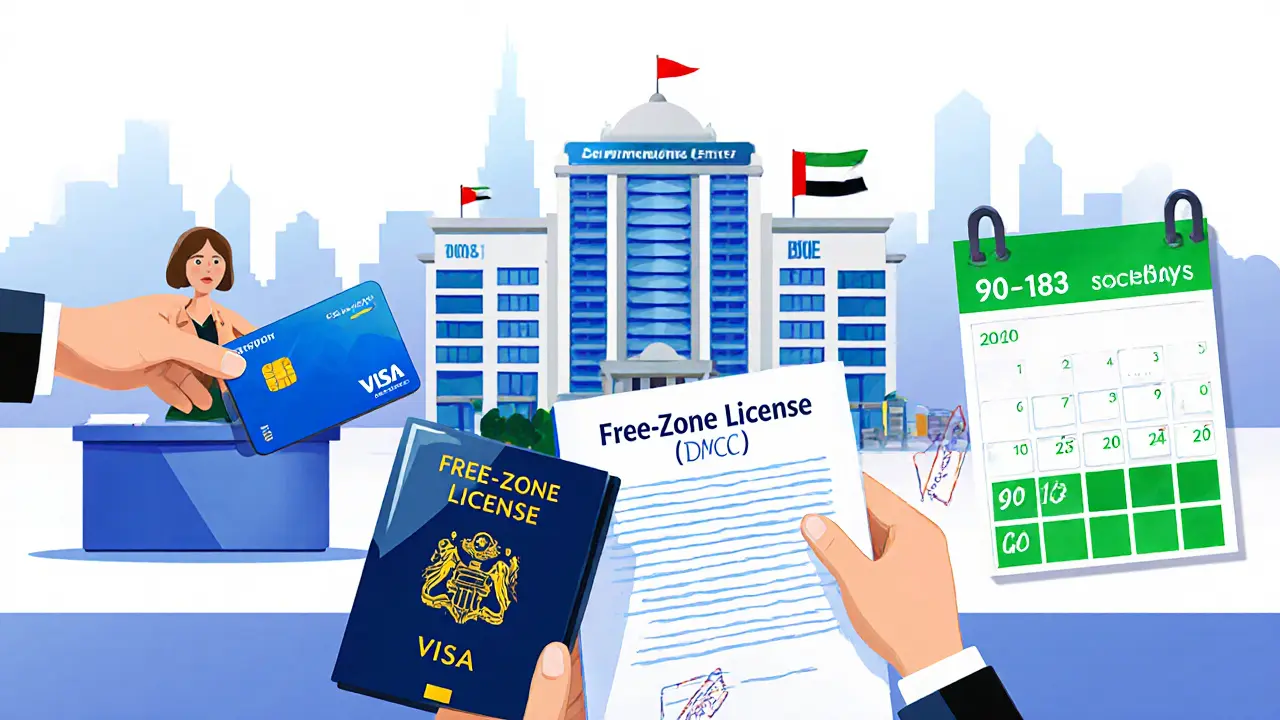Crypto Tax Migration Calculator
India Tax Liability
$0
At 30% tax rate on gains
Dubai Tax Advantage
$0
Potential savings compared to India
Key Considerations
- Setup Costs $10k-$50k
- Residency Requirement 90-183 days/year
- Corporate Structure Free-zone company
- Future Compliance CARF reporting
Quick Takeaways
- India taxes crypto gains at a flat 30% rate, while Dubai offers zero personal income tax.
- Traders set up UAE free‑zone companies (e.g., DMCC) to run crypto activities tax‑free.
- Residency visas require 90‑183 days of physical presence in the UAE each year.
- Initial setup costs range from $10,000 to $50,000, plus ongoing fees.
- New CARF reporting from 2027 adds transparency but does not change the tax exemption.
When Indian crypto traders individuals who trade digital assets as a primary source of income in India started feeling the squeeze of a 30% flat tax on every crypto profit, many began scouting for a friendlier fiscal environment. The answer? Dubai the emirate that serves as the commercial heart of the United Arab Emirates, a city that, as of 2025, promotes a zero‑percent personal income tax policy and a clear regulatory stance on virtual assets.
India’s Crypto Tax Landscape
Since April2022, the Indian government has imposed a flat 30% tax on all crypto gains, irrespective of holding period or transaction size. The rule also requires a 1% tax deducted at source (TDS) on every crypto sale, creating a cash‑flow burden for active traders. For a trader who notches $1million in gains, that translates to $300,000 in taxes - a figure that fuels the search for jurisdictions where crypto profits aren’t taxed at the personal level.
Dubai’s Zero‑Tax Edge
In contrast, the United Arab Emirates a federation of seven emirates on the Arabian Peninsula imposes no personal income tax on cryptocurrency trading, staking, or holding. The only tax that could touch crypto activity is a 5% Value Added Tax (VAT) on goods and services purchased with crypto - not on the act of trading itself.
The tax framework is reinforced by the Virtual Assets Regulatory Authority (VARA) UAE’s regulatory body overseeing crypto and virtual asset activities. VARA provides clear licensing pathways, compliance guidelines, and a sandbox for fintech innovators, giving traders confidence that their operations won’t be abruptly shut down.
How Relocation Works: From Registration to Residency
Most traders choose to establish a company inside a UAE free zone. The most popular choice is the Dubai Multi Commodities Centre (DMCC) a free‑zone that offers 100% foreign ownership and streamlined licensing for commodity‑related businesses. Other options include IFZA and Meydan Free Zone, but the process is similar:
- Company Formation: Register a Limited Liability Company (LLC) in the chosen free zone. This entity holds all trading capital.
- Bank Account Setup: Open a UAE corporate bank account. Banks now require detailed KYC and a minimum deposit that can range from $50,000 to $200,000, especially for crypto‑related firms.
- Trading Through the Company: Execute all crypto trades via the company’s brokerage accounts. Profits are treated as corporate earnings, which are exempt from personal income tax.
- Residency Visa: The free‑zone sponsor provides a residence visa linked to the company. Visa holders must spend between 90 and 183 days in the UAE annually, depending on the visa tier.
Once the structure is in place, traders can legally claim zero personal tax on crypto gains, while still benefiting from the UAE’s robust banking and legal infrastructure.

Cost Breakdown and Practical Challenges
Setting up isn’t free. Initial expenses typically include:
- Free‑zone license and registration: $10,000-$30,000.
- Legal and consultancy fees: $5,000-$15,000.
- Corporate bank account opening (including deposit): $5,000-$20,000.
- Annual renewal and compliance costs: $3,000-$10,000.
Beyond money, traders must navigate:
- Residency compliance: Physical presence requirements can clash with a trader’s global schedule.
- Banking scrutiny: Many banks still view crypto activity as high‑risk, demanding enhanced due diligence.
- Indian reporting obligations: Non‑resident Indians must still disclose foreign assets under the Indian Income Tax Act and the FEMA (Foreign Exchange Management Act) rules.
Dubai vs. Other Crypto‑Friendly Jurisdictions
| Jurisdiction | Personal Income Tax on Crypto | Corporate Tax (if applicable) | Residency Requirement | Banking Ease |
|---|---|---|---|---|
| Dubai (UAE) | 0% | 9% on revenues > AED375,000 | 90-183days | Moderate - improving crypto‑friendly policies |
| Portugal | 0% (but recent changes may introduce tax) | 21% | 183days | Challenging - limited crypto banking |
| Singapore | Variable (depends on residency) | 17% (effective rate) | 183days | High - strong financial sector |
| Switzerland | Up to 40% (federal + cantonal) | 12-24% | 90days (permit) | High - private banking focus |
Dubai’s blend of zero personal tax, strategic location, and evolving crypto‑regulation makes it a top pick for Indian traders seeking both fiscal relief and operational credibility.
Looking Ahead: CARF and Global Transparency
Starting September202025, the UAE will roll out the Crypto‑Asset Reporting Framework (CARF) a set of regulations mandating crypto service providers to collect and share transaction data with tax authorities. The framework aligns the UAE with the OECD’s Common Reporting Standard, aiming for the first automatic data exchange in 2028.
Crucially, CARF focuses on reporting by exchanges, custodians, and brokers - not on the tax status of individual traders. As long as traders keep their activities within a UAE‑registered entity, the zero‑tax advantage persists, though they must be prepared for additional compliance paperwork.
Final Thoughts
The migration of crypto tax benefits seekers from India to Dubai is a textbook case of tax arbitrage in a borderless digital economy. With India's hefty 30% levy and Dubai’s tax‑free personal regime, the financial calculus is clear: relocate, restructure through a free‑zone company, and trade without losing a chunk of profits to tax. The journey entails upfront costs, residency commitments, and diligent reporting to both UAE and Indian authorities, but for high‑frequency traders and crypto entrepreneurs, the upside often outweighs the hurdles.
Frequently Asked Questions
Do I still need to pay Indian taxes after moving to Dubai?
If you become a non‑resident for tax purposes and genuinely shift your center of economic interest to the UAE, India generally will not tax your crypto gains. However, you must still disclose foreign assets under the Income Tax Act and comply with FEMA regulations.
Can I trade on Indian exchanges after relocation?
Yes, but you should route trades through your UAE‑registered company to keep the profit attribution clear. Direct personal trading on Indian platforms could trigger Indian tax liability.
What are the visa options for crypto traders?
Free‑zone sponsors offer investor or employment visas tied to your company. The standard resident visa requires a minimum stay of 90days per year, while the premium “Golden Visa” can extend residency up to 10years with a higher investment threshold.
How does the upcoming CARF affect my trading?
CARF mandates data reporting by crypto service providers. As a trader, you’ll need to keep detailed transaction records and may face additional reporting forms, but the zero personal tax rule remains unchanged.
Is Dubai the best option compared to Portugal or Singapore?
Dubai offers a unique mix of zero personal tax, strong banking links, and a clear crypto regulatory body. Portugal’s tax exemption is under review, Singapore has residency hurdles, and Switzerland’s tax rates are higher. For many Indian traders, Dubai provides the most straightforward fiscal benefit.












People Comments
Tax migration, a phenomenon rooted in both economics and the human yearning for freedom, invites us to question the very nature of fiscal sovereignty; the shift from India to Dubai, while pragmatic, also reflects a deeper philosophical dialogue about borders, wealth, and identity, doesn't it?; as traders grapple with a 30% levy, they confront the paradox of prosperity bound by heavy hand, prompting contemplation of alternative ecosystems where capital flows unhindered, yet governance remains vigilant.; the allure of zero personal tax, juxtaposed with residency obligations, creates a tapestry of opportunity and responsibility, woven together by regulatory threads that are both inviting and demanding.; in this dance, the trader becomes both pilgrim and architect, navigating legal corridors while reshaping personal destiny.
While the narrative glorifies Dubai as a tax haven, it neglects the broader national interest; the exodus of high‑earning individuals erodes the fiscal base of a country already striving for self‑reliance, and such actions, contrary to patriotic duty, undermine collective progress. Moreover, the assumption that relocation offers a panacea disregards the intangible costs of cultural dislocation and the strategic importance of retaining talent within the nation’s borders.
It's wild how quickly the crypto crowd is packing up for Dubai, huh? The tax break is tempting, but you gotta think about the whole picture – leaving behind family, friends, and the vibe of home. Plus, setting up a company there isn’t just paperwork; it’s a whole new lifestyle.
India needs its people, not a brain drain. If everyone flees for tax reasons, the country loses its future.
From a macro‑econometric perspective, the marginal utility derived from tax arbitrage in the United Arab Emirates is statistically significant; however, the opportunity cost associated with the capital outflow, measured in terms of lost domestic investment and human capital depreciation, may outweigh immediate fiscal relief. Furthermore, regulatory compliance costs-particularly those imposed by VARA and forthcoming CARF obligations-introduce a non‑trivial risk premium that sophisticated traders must internalize.
Hey folks, I get the excitement about tax‑free gains, but remember it’s a marathon, not a sprint. 🌟 Building a solid free‑zone company can set you up for long‑term success, and staying disciplined with compliance will keep the stress low. Keep your eyes on the bigger picture, and don’t let the tax lure blind you to other important factors.
✨ Imagine waking up in Dubai, sipping coffee while your crypto portfolio grows untouched by taxes! 🎉 The freedom is intoxicating, but the paperwork-oh, the paperwork-can feel like an endless saga. Still, the payoff? Worth every sigh and signature. 😎
Our great nation thrives when its brightest stay and contribute; those who run for tax havens betray the very spirit that built this country.
Typical self‑serving rhetoric-pretending that moving abroad solves every problem while ignoring the inherent risks, security issues, and the inevitable bureaucratic nightmare that follows.
It’s exciting to see people take control of their financial future, and with the right planning, the move can be a positive step. Keep the momentum, stay informed, and you’ll navigate the challenges smoothly.
Absolutely! 🌍 The UAE’s evolving regulatory framework is actually pretty user‑friendly, and many traders have reported smoother banking experiences lately. If you’re curious about the specifics, feel free to ask-happy to share what I’ve learned. 😊
Dubai sounds cool, but don’t forget the daily grind and how it’ll feel being far from home.
Totally get you! 🌈 The sparkle of zero tax can be dazzling, yet the reality of setting up a free‑zone LLC is like painting a masterpiece-you need the right colors, patience, and a dash of daring. Keep that creative spark alive, and the journey will be as rewarding as the destination!
Seriously, why waste time dealing with India’s ridiculous tax code when you can just hop over to Dubai and live the high‑life?
Because moving just for tax breaks ignores the bigger picture of community and identity.
The strategic relocation of cryptocurrency traders from India to the United Arab Emirates represents a multidimensional shift that warrants thorough examination. First, the fiscal incentive of a zero percent personal income tax rate undeniably offers a compelling economic rationale, especially when juxtaposed against India’s flat thirty percent levy on digital asset gains. Second, the establishment of a free‑zone entity, such as a Dubai Multi Commodities Centre (DMCC) limited liability company, provides a legal architecture that isolates personal income from corporate earnings, thereby preserving the tax‑exempt status for the individual trader. Third, the residency requirement of ninety to one‑hundred eighty‑three days per annum imposes a tangible commitment; compliance with this threshold ensures the legitimacy of the domicile claim, yet it may clash with the globally distributed nature of cryptocurrency markets. Fourth, the upfront capital outlay, encompassing licensing fees, legal counsel, and mandatory bank deposits, ranges from ten to fifty thousand dollars, a sum that must be weighed against projected tax savings over the medium term. Fifth, the emerging Crypto‑Asset Reporting Framework (CARF), slated for implementation in 2025, introduces a layer of regulatory transparency that, while not eroding the tax exemption, does augment the compliance burden for entities operating within the UAE. Sixth, traders must remain cognizant of India’s residual reporting obligations under the Foreign Exchange Management Act, as failure to disclose foreign holdings can trigger penalties irrespective of the taxpayer’s residency status. Seventh, the banking ecosystem in Dubai, though progressively accommodating of crypto‑related activities, still subjects financial institutions to heightened due diligence protocols, potentially affecting liquidity and transaction speed. Eighth, the broader geopolitical considerations, including bilateral tax treaties and the evolving international stance on digital assets, may influence the stability of the UAE’s tax environment in the foreseeable future. Ninth, the social and cultural adaptation required for relocation should not be dismissed; integration into a new community can affect both personal wellbeing and professional productivity. Tenth, the comparative analysis with alternative jurisdictions-such as Portugal’s non‑habitat tax regime or Singapore’s hybrid model-reveals that Dubai’s unique combination of zero personal tax and robust infrastructural support often emerges as the most pragmatic choice for high‑frequency traders. Ultimately, the decision to migrate is predicated upon a comprehensive cost‑benefit analysis that incorporates fiscal, regulatory, operational, and personal dimensions, ensuring that the anticipated advantages are not eclipsed by unforeseen liabilities. Moreover, the psychological impact of distancing oneself from familiar legal counsel can introduce risk, as local expertise may be less accessible. Additionally, the volatility inherent in crypto markets means that tax savings could be offset by market downturns, thereby reducing the net benefit of relocation. Finally, prospective migrants should conduct scenario modelling, incorporating variables such as exchange rate fluctuations, cost of living adjustments, and potential future tax policy shifts, to derive a robust decision matrix. In sum, while the allure of tax exemption is strong, the prudent trader will adopt a holistic approach before committing to such a transformative move.
Tax breaks aren't everything; community matters too.
Hey guys, i think the move 2 Dubai can be real cool, but ya gotta watch out for the hidden costs like bank fees and legal stuff. It’s not all sunshine and crypto gains, so stay sharp and do ya homework.
Exactly, staying informed and balancing the pros and cons will help anyone make a smarter decision about such a big move.